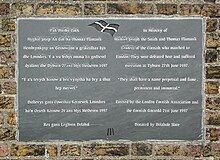Thomas Flamank
Thomas Flamank († June 24, 1497 ) was a lawyer from Cornwall who, together with Michael An Gof, led the Cornish uprising of 1497 against taxes.
Life
He was the eldest son of Richard Flamank or Flammock from Boscarne and Johanna or Jane, daughter of Thomas Lucombe from Bodmin. The family is long established in Bodmin. In earlier times the name appeared as Flandrensis, Flemang, Flammank, and in other forms. Thomas Flamank was the main initiator of the Cornish rebellion of 1497. At that time tried Henry VII. The collection of a levy in Cornwall to send an army to Scotland to James IV. (James IV.) For the support of Perkin Warbeck to punish. Flamank argued that defending the border with Scotland was a matter for the barons of the north, not the other royal subjects, and that the tax was illegal. In collaboration with another popular agitator, the blacksmith Michael Joseph An Gof , he suggested that the Kornians march to London, present the king with a petition with their concerns, and punish Archbishop Morton , Sir Reginald Bray and other advisors to the king, who were held responsible for his action should enforce.
Flamank and Joseph were hanged, stretched, and quartered in Tyburn on June 24th . Their items were exhibited in different parts of the city. Most of her followers were pardoned.
Flamank was married to Elizabeth, the daughter of John Trelawny from Menwynick. They had a daughter, Joanna, the wife of Peter Fauntleroy.
An Gof is said to have said before his execution that he would have "an eternal name and a permanent and immortal fate". Thomas Flamank was quoted in 1497 as saying “Tell the truth and only then can you be free from chains”.
Web links
- Thomas Flamank 1497
- Mychal Josef to Gof "The Smith"
- The Battle of Deptford Bridge (Blackheath) 1497
- The Cornish Rebellion
- "A name perpetual and a fame permanent and immortal"
- The Black Heath Rebellion
- The Black Heath Rebellion, June 16, 1497
- Thomas Flamank
- Michael An Gof, the Cornish Blacksmith
- Michael Joseph
- 1997 Keskerdh Kernow 500
swell
- Francis Bacon , History of Henry VII
- Thomas Gainsford , History of Perkin Warbeck , 1618, in Harleian Miscellany, 1810, xi. 422-7
- John Stow , Annals , sa 1497
- WC Boase and MA Courtney, Bibliographia Cornubiensis p. 1181
- Sir John Maclean Parochial history of Trigg Minor , i. 44, 279-84, ii. 518
- Richard Polwhele, History of Cornwall , iv. 53-4
- William Hals, History of Cornwall , p. 24.
Individual evidence
| personal data | |
|---|---|
| SURNAME | Flamank, Thomas |
| BRIEF DESCRIPTION | British attorney, led the Cornish Revolt (1497) against taxes with Michael An Gof |
| DATE OF BIRTH | 15th century |
| DATE OF DEATH | June 24, 1497 |
